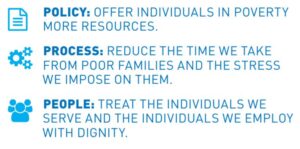Changes Big and Small: What’s Needed in the Fight Against Poverty
Download PDF of the full essay
By Robert Gordon, then director of the Michigan Department of Health and Human Services
Introduction
Jeff Cook, the district manager for the Michigan Department of Health & Human Services’ office on Union Street in Flint, Michigan, recently shared with me a note from a caseworker, Trisha Kirby. While most of our staff work in offices, Ms. Kirby works out of a homeless shelter called My Brother’s Keeper.
She wrote to Mr. Cook about a client, let’s call him Leonard Davis. Mr. Davis came into the office hungry.
He told her, “I had two jobs, I love to work. One night I was walking home from work and the police stopped me. They said I needed to walk on the sidewalk and not in the road. I didn’t know that I had an old warrant for arrest. They ran my information and I went to jail. I lost both of my jobs.”
Mr. Davis was at the shelter to get a meal and some help. He already had health care through MDHHS, and also hoped to get food assistance through SNAP (formerly Food Stamps). He’d lost his account information, so Ms. Kirby looked him up and shared it with him. To get food benefits, though, Ms. Kirby told Mr. Davis about the rules regarding assets—what someone can have in a bank account or other savings. Mr. Davis reported that he had a bank account with the minimum to keep it open, around $5. But the rules meant that Ms. Kirby needed proof, and so she asked him to come back with an account statement.
Unlike many of our clients, Mr. Davis came back in 45 minutes with his bank statement. He had a balance of $5.57. Now that she had that, Ms. Kirby signed him up for benefits, and she referred him to MichiganWorks!, our state’s workforce agency, for help finding a new job. “You are a godsend!” Mr. Davis told her. Then he left. He and Ms. Kirby have kept in touch, and last we heard, he was headed to orientation for a new job that pays $16 an hour.
End of story
Let’s be honest. This is not a story of transformation. It is not about “big structural change.” It falls well short of what many hope for America’s future: Medicare for All, Universal Basic Income, guaranteed jobs. Even so, this story is also about fundamental goods: how two human beings connected; how one enabled the other to find food and employment; how government, so often maligned, made the world better.
We need more of these kinds of stories. Along with those important conversations about big transformational changes, we need to ask—in a divided state, in a divided nation, how can we reform government now to be more effective in honoring human dignity and meeting basic human needs?
Today in Michigan, we’re working to answer that question. We are answering it based on three principles:

All of this will sound Hallmark simple. And it is. We have gone astray by making things too complicated. If we stay anchored in these simple ideas, we can activate a compelling agenda to fight poverty. Effective government will be necessary for Washington to deliver on transformative change. And it will also serve us well if that delivery is delayed.
